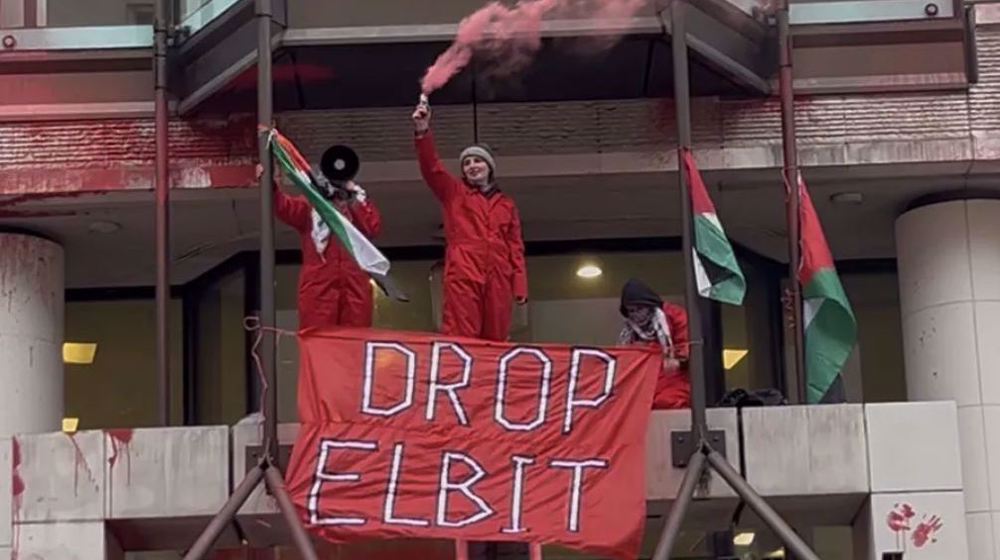Activism is not terrorism: Israel-US-UK campaign to silence pro-Palestinian voices
By Julia Kassem
As we mark 23 years since 9/11—a false flag operation orchestrated by the US to justify the invasion of Afghanistan and plundering of Iraq—and approach a year since the launch of the genocidal war on Gaza, American rhetoric on the so-called “war on terror,” counterinsurgency tactics, and Orwellian silencing campaigns continue to reach new heights in Western countries.
While the events of 9/11 and the Operation Al-Aqsa Flood differ fundamentally in their spirit and essence, Western intelligence agencies have repurposed repressive tactics developed during the former—executed by their Takfiri terrorist proxies—to combat the latter.
These methods have aimed to deter the West from acknowledging the legitimacy of resistance and dismantling the oppressive structures that exist within the imperial core.
A recent example of this repression was witnessed in the UK, with activists yet again facing a crackdown for their Palestinian solidarity. It was carried out under the framework of Section 12 of Britain’s 2000 Anti-Terrorism Act, which criminalizes "encouraging support" for some organizations.
Section 12 of Britain’s 2000 Anti-Terrorism Act is part of the British intelligence’s PREVENT framework, a branch of the CONTEST counterterrorism strategy implemented in the aftermath of the 9/11 hysteria.
In mid-August, Syrian-British independent journalist Richard Medhurst, a vocal campaigner against Israeli apartheid and occupation, was held at London's Heathrow Airport for nearly 24 hours.
"I criticized the Terrorism Act before getting on the plane, then got arrested under the Terrorism Act upon landing. Can't make this up,” he wrote on his social media.
Medhurst was arrested under Section 12 of the Terrorism Act of 2000 and accused of “expressing an opinion or belief that is supportive of a proscribed organization,” a veiled reference to Hamas.
Only days after, plainclothes, masked men, accompanied by 17 police cars, raided the home of another prominent British pro-Palestinian activist Sarah Wilkinson at around 7:10 AM local time.
In the process of ransacking her home, desecrating her mother’s ashes, and leaving no personal item untouched, they demanded the precise coordinates of Rebuild Gaza’s well-building charity sites that Wilkinson had helped campaign for.
Independent journalist critical of Israel’s Gaza war briefly arrested in UK
— Press TV 🔻 (@PressTV) August 20, 2024
https://t.co/ffKu34Eai4
This clearly points to the use of such information to aid the Israeli genocide of Palestinians and their infrastructure, which the UK government has actively aided and abetted.
Wilkinson said the nature of their interrogation and their uncharacteristically aggressive behavior suggested that the operatives might have been Israeli or Mossad agents.
The activist said the agents violated police protocols and made extremely racist statements at her, such as asking her, “Why do you think Palestinians are better than white people?”
Weaponizing the so-called Terrorism Act was particularly aimed at silencing Wilkinson. “The thing is with the Terrorism Act, which is unlikely to go to trial, is they’ll either drop it or keep extending the bail.”
Her bail conditions, which included the confiscation of her phone and laptop, were harsh. “The bail conditions are the jail sentence,” which prevented her from documenting Israeli war crimes.
That same day, Palestine Action's co-founder Richard Barnard was also arrested after expressing support for the Palestinian resistance against the Israeli genocide that has already claimed the lives of more than 41,000 lives, most of them children and women.
Apart from that, for over a month, ten young Palestine Action activists, known as the Filton 10, have been held on terrorism charges—separate from their actual conviction of burglary and damage after causing £1 million in damages to an Israeli Elbit weapons factory.
Despite these separate charges, they were held under terrorism-related accusations, highlighting the UK government’s overreach in treating pro-Palestine political activism as terrorism.
The group had been on the British government’s watch for months, coming under the UK’s designation of “extreme protest groups” - which emboldened the UK government to overextend their authority, holding and questioning them as terrorists despite being charged for completely different reasons.
The UK police has reportedly arrested pro-Palestine activist Sarah Wilkinson. pic.twitter.com/19pfDIYssj
— Press TV 🔻 (@PressTV) August 29, 2024
The crackdown coincided with a massive censorship drive against pro-resistance outlets on Telegram—one of the few platforms not fully controlled by the West. The final straw for Western powers was Iran’s seizure and leak of confidential Israeli intelligence data months earlier.
Israel embarked on an aggressive campaign to “censor the internet,” as described by Haaretz, to contain the most severe data leaks in its history.
Israeli newspaper Haaretz also noted the difference in approach between the US and Israel in dealing with leaks. While the US typically prosecutes leakers and accepts the online existence of leaked material, the regime in Tel Aviv resorts to a different approach—using tech firms’ internal rules to erase leaked data from public view.
“The policy and the way it is deployed makes Israel unique. Many countries, including the US, usually take criminal or legal steps against leakers, foreign and local, but will make peace with the leak's existence online,” stated Haaretz.
“Israel, on the other hand, uses tech firm's internal rules to get them to take down the hacked goods on its behalf – and thus prevent the leaked data from reaching the public or journalists, both in Israel and abroad.”
Despite its best efforts, the Israeli regime has had limited success in censoring Telegram, managing only 1,300 requests in contrast to Facebook’s 40,000, showing the impact of control on social media.
In 2022, Israel even established Telemetry Data Labs, a cyber intelligence platform focused specifically on harvesting data from Telegram for the Israeli military and intelligence. Telemetry’s CEO, Ari Ben Am, previously worked in cyber intelligence platforms and think tanks linked to Israeli intelligence.
Telegram’s founder, Pavel Durov, was arrested in France on August 24, barely days after hackers released the confidential Israeli files online that grabbed headlines worldwide.
Telegram, not controlled directly by the West, became the target of demands to hand over encryption keys—requests that Durov had refused in the past, even to his native country Russia.
The US also banned the Resistance News Network, a social media channel with over 167,000 subscribers, as part of a broader move to suppress resistance media. On August 10, Instagram also blocked the page of The Cradle, a journalist-driven news website covering West Asia.
Months before, in October 2023, days after the launch of the Al-Aqsa Flood Operation, Hamas’s official channels were also removed from Telegram on both Google and Apple platforms.
The cover-up of leaks and scramble to enforce American-Israeli mainstream media censoring - including those helping to cover up casualty counts of American and Israeli soldiers killed by the resistance in occupied Palestine and Iraq alike, is not a particularly new strategy, despite being accelerated by the current conditions and events.
In just one of the countless previous examples, The US, for example, led the charge in pressing the EU to censor pro-resistance accounts on X (formerly Twitter) and lobbied for Germany to ban the Palestinian prisoners' solidarity group Samidoun.
It is by design that, as Bassel Al-Araj noted, pro-Palestinian movements in the West often fail to challenge the underlying normalization of the Israeli regime’s illegitimate existence.
Rejecting Israeli narratives opens the door to recognizing indigenous perspectives, which challenges the very foundations of American settler colonialism and its messages of inferiority and submission to the Global South.
The ongoing efforts to sever connections between oppressed peoples and their allies in the imperial core are designed to stifle awareness of the Resistance Axis’s struggle for liberation—a struggle with inevitable global repercussions. All these repressive attempts are doomed to fail.
Julia Kassem is a Beirut-based writer and commentator, whose work appears in PressTV, Al-Akhbar, and Al-Mayadeen English. She also appears on Press TV's Expose show.
(The views expressed in this article do not necessarily reflect those of Press TV.)

Gaza’s humanitarian crisis deteriorating ‘beyond imagination’: UN chief

UK shared contact details of police, prosecutors with Israel: Report

Hamas condemns Gaza blockade as war crime, demands global action
Gaza’s humanitarian crisis deteriorating ‘beyond imagination’: UN chief
US announces new Iran sanctions despite ongoing nuclear talks
Iraqi MP files lawsuit against Syria’s leader Julani over 'terrorist' past
Iran urges Germany to probe wartime supply of chemical weapons to Iraq
Over 65,000 children hospitalized for malnutrition as Israel starves Gaza
Hamas condemns Gaza blockade as war crime, demands global action
At ICJ hearings, South Africa says Israel committing genocide with 'impunity'
Top Russian carmaker eyes localization project in Iran













 This makes it easy to access the Press TV website
This makes it easy to access the Press TV website